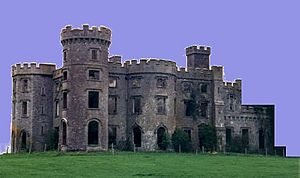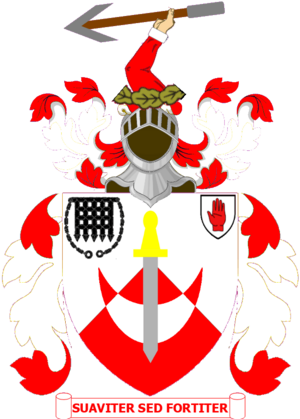Chapman baronets facts for kids

A baronetcy is a special title that can be passed down in a family, like a knight but hereditary. It's a bit like being a lord, but it's not a peerage (which means you don't get to sit in the House of Lords).
For families named Chapman, three different baronet titles have been created over time. One was in Great Britain, one in Ireland, and one in the United Kingdom. Two of these titles no longer exist, but one is still held by a Chapman family member today.
Contents
What is a Baronetcy?
A baronetcy is a hereditary honour given by the British Crown. It's a title that passes from father to son. The person holding the title is called a baronet (Sir [First Name] [Last Name], Baronet). It's a very old tradition, and it's a way to recognize important people.
The Chapman Baronets: Three Family Stories
The Chapman family has a long history with these special titles. Let's look at the three different baronetcy lines.
The London Chapmans (1720)
The first Chapman baronetcy was created in London on June 27, 1720. It was given to Sir William Chapman. He was a director of the South Sea Company, which was a big trading company.
His older son, Sir John Chapman, became the second baronet. He was a Member of Parliament for Taunton. He didn't have any children, so his younger brother, Sir William Chapman, became the third baronet. He also had no children. When he passed away in 1785, this baronetcy ended.
The Killua Castle Chapmans (1782)
The second Chapman baronetcy was created in Ireland on March 11, 1782. This title was linked to Killua Castle in County Westmeath. It was given to Benjamin Chapman. The special rule for this title was that if he had no sons, it would pass to his younger brother, Thomas.
Benjamin Chapman was a Member of Parliament for Fore and County Westmeath in the Irish House of Commons. As he had no sons, his brother, Thomas, became the second baronet.
Thomas's older son, Montagu Lowther Chapman, became the third baronet. He was also a Member of Parliament for County Westmeath. He never married, so his younger brother, Benjamin James Chapman, became the fourth baronet. He also represented County Westmeath in Parliament and served as the Lord Lieutenant of County Westmeath, a royal representative.
This baronetcy ended when the seventh baronet, Sir Thomas Robert Tighe Chapman, passed away in 1919. He was the father of T. E. Lawrence, who became very famous as Lawrence of Arabia.
The Cleadon Chapmans (1958)
The third Chapman baronetcy was created much more recently, on January 30, 1958. This title is linked to Cleadon in what is now Tyne and Wear. It was given to Robert Chapman. He was a soldier and a Conservative Member of Parliament for Houghton-le-Spring.
His son, Robert MacGowan Chapman, became the second baronet. He served as High Sheriff of Durham in 1960, which is a ceremonial role.
As of 2010, the title is held by the second baronet's son, David Robert Macgowan Chapman, who became the third baronet in 1987. He has been a deputy lieutenant of Tyne and Wear since 1997. The title is still active today.
List of Baronets
Here are the people who have held the Chapman baronet titles.
London Baronets (1720)
- Sir William Chapman, 1st Baronet (about 1670–1737)
- Sir John Chapman, 2nd Baronet (about 1710–1781)
- Sir William Chapman, 3rd Baronet (1714–1785)
Killua Castle Baronets (1782)
- Sir Benjamin Chapman, 1st Baronet (died 1810)
- Sir Thomas Chapman, 2nd Baronet (1756–1837)
- Sir Montagu Lowther Chapman, 3rd Baronet (1808–1853)
- Sir Benjamin James Chapman, 4th Baronet (1810–1888)
- Sir Montagu Richard Chapman, 5th Baronet (1853–1907)
- Sir Benjamin Rupert Chapman, 6th Baronet (1865–1914)
- Sir Thomas Robert Tighe Chapman, 7th Baronet (1846–1919)
Cleadon Baronets (1958)
- Sir Robert Chapman, 1st Baronet (1880–1963)
- Sir Robert MacGowan Chapman, 2nd Baronet (1911–1987)
- Sir David Robert Macgowan Chapman, 3rd Baronet (born 1941)
- The next person in line for this baronetcy is Michael Nicholas Chapman (born 1969).
 | Leon Lynch |
 | Milton P. Webster |
 | Ferdinand Smith |


